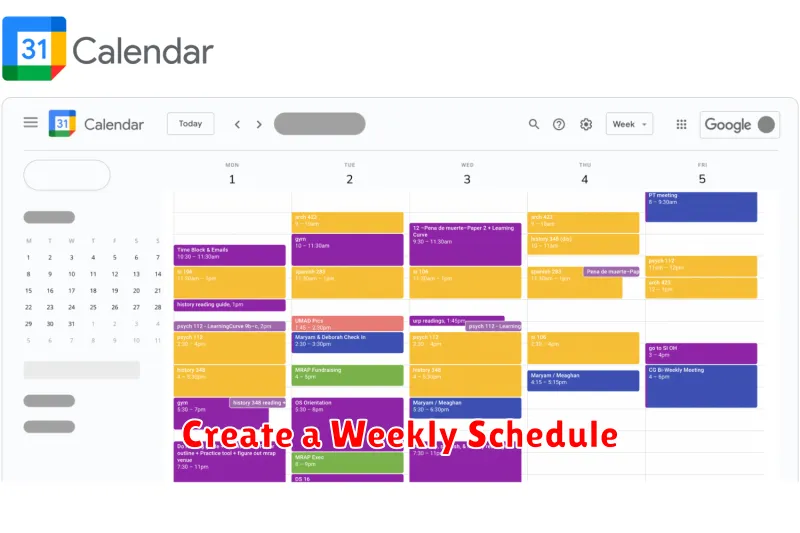Juggling the demands of academic life with the responsibilities of a part-time job can be a challenging yet rewarding endeavor. Many students find themselves needing to balance study and part-time work to fund their education, gain valuable work experience, or simply manage their finances. This balancing act requires effective time management, prioritization, and a strong commitment to both academic and professional success. This article provides practical strategies and actionable advice to help students navigate the complexities of balancing study and part-time work effectively.
Successfully navigating the complexities of study and part-time work requires a proactive and organized approach. Students must learn to prioritize tasks, manage their time efficiently, and maintain a healthy work-life-study balance. From creating a realistic schedule to developing effective study habits, the following sections will offer insightful tips and techniques to help students excel in both their academic pursuits and their part-time jobs, ensuring they make the most of their time and energy.
Know Your Work Hour Limits
Balancing study and part-time work requires careful management of your time and energy. A crucial aspect of this balance is understanding your work hour limits. Overworking can negatively impact your academic performance and overall well-being.
Students often face competing demands on their time. Working too many hours can lead to sleep deprivation, increased stress, and difficulty concentrating in class. It’s important to establish reasonable limits on your work schedule to ensure you have enough time for studying, attending classes, and engaging in other essential activities.
Consider your course load and the intensity of your studies. If you’re taking a full course load with demanding subjects, you may need to limit your work hours more than someone with a lighter academic schedule.
Be realistic about how much you can handle. Start with a conservative number of work hours and gradually increase if you find you can manage more without compromising your academic performance.
Create a Weekly Schedule

A well-structured weekly schedule is essential for effectively balancing study and part-time work. Begin by identifying your fixed commitments, such as class times and work shifts. Mark these down in a planner, either physical or digital.
Next, allocate specific time slots for studying. Treat these study blocks with the same importance as your work shifts. Be realistic about how much time you can dedicate to each subject and avoid over-scheduling yourself.
Prioritize your tasks based on deadlines and importance. Use a system to differentiate between urgent and important tasks. For example, you could use a color-coding system within your schedule.
Finally, remember to incorporate breaks and downtime into your schedule. This is crucial for maintaining your well-being and avoiding burnout. Even short breaks can significantly improve focus and productivity.
Prioritize Academic Deadlines
Balancing work and studies requires strong organizational skills and a clear understanding of your priorities. Academic deadlines should generally take precedence. Failing a course or submitting subpar work due to time constraints can have long-term consequences on your academic progress and future career prospects.
Use a planner, either physical or digital, to keep track of all your commitments. Input every assignment, test, and project deadline as soon as it’s announced. This allows you to visualize your workload and anticipate potential conflicts with your work schedule.
Allocate sufficient study time around these deadlines. Don’t wait until the last minute to begin working on major projects. Breaking down large tasks into smaller, manageable chunks makes them less daunting and allows you to make steady progress.
Look for Flexible Student Jobs
Balancing study and part-time work requires careful consideration of your job’s flexibility. Prioritize positions that offer adaptable scheduling.
Consider roles like:
- Tutoring: Often allows you to set your own hours and work around your class schedule.
- Freelance work: Offers flexibility in terms of workload and deadlines, allowing you to adjust your work hours as needed.
- On-campus jobs: These positions are often designed with student schedules in mind.
- Retail or hospitality (evenings/weekends): These can be good options if your classes are primarily during the week.
When searching for jobs, clearly communicate your availability to potential employers. This will help ensure a good fit and prevent scheduling conflicts down the road.
Look for employers who understand the demands of being a student and are willing to work with your academic schedule.
Stay Organized with Planning Tools
Balancing study and part-time work requires diligent organization. Utilizing planning tools can significantly improve your ability to manage both effectively. Calendars, whether digital or physical, are essential for tracking deadlines, shifts, and study sessions.
To-do lists can help break down large tasks into smaller, manageable steps, making your workload feel less overwhelming. Consider using a task management app or a simple notebook to keep track of your responsibilities.
Prioritize tasks by assigning them levels of importance. Focus on completing high-priority items first to ensure crucial deadlines are met. Schedule specific blocks of time for both work and study, treating them as equally important appointments.
Learn to Say No to Overload
One of the most crucial skills for balancing study and part-time work is learning to say no. It’s easy to become overloaded, especially when you’re eager to please or earn extra money. However, taking on too much can lead to burnout, negatively impacting both your academic performance and your job.
Prioritize your commitments. Identify your most important tasks – academic deadlines, essential work shifts – and focus on those first. This will require careful planning and time management.
Be assertive but polite. When declining extra shifts or social invitations, explain your situation briefly and honestly. A simple “I appreciate the offer, but my studies are keeping me very busy right now” is usually sufficient.
Don’t over-commit. Before agreeing to any new commitments, carefully consider whether you have the time and energy to dedicate to it. It’s better to decline than to over-promise and under-deliver.
Take Care of Mental Health
Juggling work and studies can be stressful. Prioritizing mental well-being is crucial for maintaining balance and succeeding in both areas. Ignoring mental health can lead to burnout, decreased productivity, and overall dissatisfaction.
Recognize the signs of stress. These can include difficulty sleeping, changes in appetite, irritability, and difficulty concentrating. If you experience these, take proactive steps to address them.
Schedule regular breaks. Short breaks throughout the day can improve focus and prevent burnout. Even a five-minute break can make a difference.
Practice relaxation techniques. Activities such as deep breathing exercises, meditation, or spending time in nature can help reduce stress and promote a sense of calm.
Connect with your support system. Talking to friends, family, or a counselor can provide emotional support and help you manage stress effectively.

